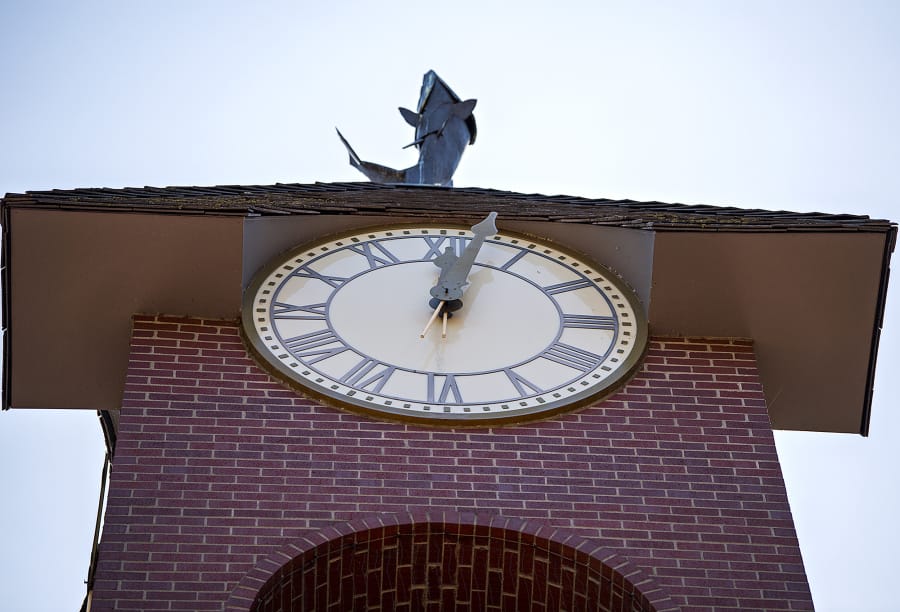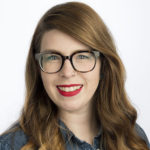Despite its towering presence near the southeast corner of Esther Short Park, the Salmon Run Bell Tower is a bit of a mystery to the park’s many visitors. But like the native legend the tower’s glockenspiel relates, the story of its creation exists in the memories of those who were involved in its development more than 16 years ago.
A Columbian reader recently asked if the Salmon Run Bell Tower still tells the story of the salmon or if the fish had gone quiet.
The story still exists. It’s just shifted a little bit.
When the tower and glockenspiel were new, the story and hourly chimes played on the hour at noon, 2 and 4 p.m. The timing of the chimes has since changed, which may be why many in the community think the story has passed out to sea.
The story, which features an audio recording and illustrative panels that emerge from the tower, still plays at the same time. The story lasts six minutes and the chimes now play either before or immediately after, depending on the time of day.
Story behind the story
Esther Short Park in its current state was inspired by the late George Propstra, Burgerville’s founder, and his desire to give Vancouver a living room that rivaled Portland’s Pioneer Courthouse Square. Propstra and his wife, Carolyn, donated $3.6 million to fund the park’s renovation. Those funds were managed by the Community Foundation for Southwest Washington.
Nancy Hales, then Nancy Sourek, former executive director of the Community Foundation, said Propstra came into her office and asked what they could do to make that happen.
As Hales recalls, his request came at just the right time. Mayor Royce Pollard was talking about renovating the park. So they carved out a corner with the intent to build a community space mimicking Pioneer Courthouse Square.
“Our intent was to have something that no one else has … and because of our connection with the Native Americans, connect it to our river and the importance of salmon to back then and today,” Pollard said.
Hales said they wanted to honor the first residents of Clark County and loved that the salmon story talked about renewal and respect for the environment. The Chinook Tribe consulted on the imagery of the glockenspiel and the story itself. The words, now spoken three times a day, were written by local historian Pat Jollota.
Propstra died on Christmas Day in 2004 but the park remains as Vancouver’s living room.
“It was really a turning point, I think, for the city,” Hales said. “I know George and I felt so proud and so glad that all of the things private philanthropy can do, it can really share an important legacy. It can build important public spaces. It can reactivate a downtown.”
The Salmon story
SCENE ONE:
“The first salmon of the year, yearly migration was accorded special honors and prayers. At the sighting all fishing halted. The fish was carried with great ceremony to the village and the sound of singing echoed across the river. Prayers of gratitude, joy and blessing would be recited.
“The salmon was thanked for the gift of his body to the people to be placed on the table in the midst of the village, surrounded by the people of the river. The great chief, then the great ceremony, cut the fish lengthwise so the body would remain whole. The women then fastened the fish to a special rack and placed it close to the fire to cook. When the salmon was ready all the villagers would eat the meat of this one special fish.”
SCENE TWO:
“Once the ceremonial feast ended, uneaten bones and parts were gathered together. A meticulous search ensued so that nothing was left behind. Once again the singing and praise of people of the river accompanied the remains of the fish, the first salmon, back to the river’s edge.
“And once again the salmon was thanked for his blessing of the people. And he was asked to return to them again the following year.”
SCENE THREE:
“The remains were reverently returned to the river’s waters that flowed to the sea from which the salmon had come. The ancestral spirit of the first salmon would be sent back into the river for the return trip to the sea. Once in the water, the salmon would regain his human form and return to this village under the sea. Once there he would be asked by the people of his tribe of the treatment he received from the tribe of the land. He could then tell his villagers that he had been treated with great respect and gratitude. His tribe would be pleased and vow to return again next year to the river and the people of the river. The cycle of life from water and land continued through the spirit of the salmon. May the spirit of the river be the strength of the river. The salmon was a magical creature.”





